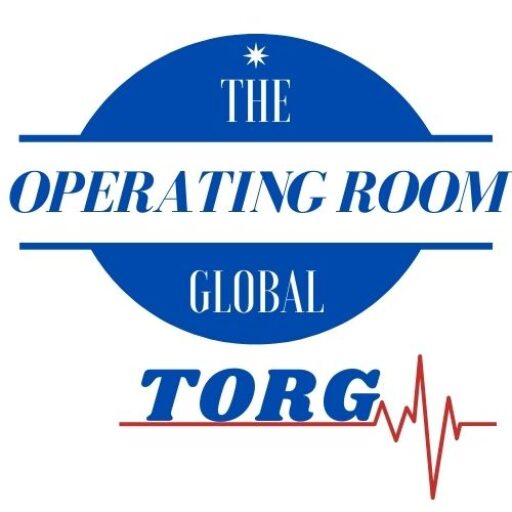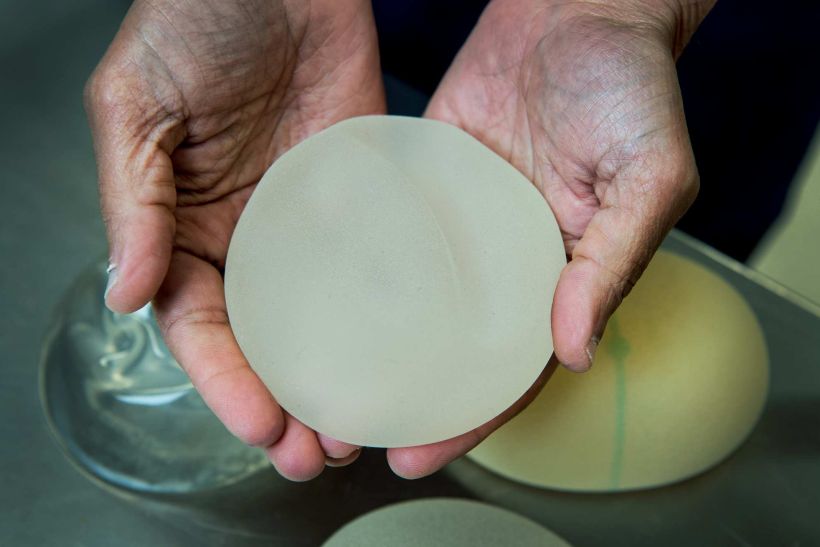PHOTO A grade-two breast implant which is under review by the TGA.ABC NEWS: BRENDAN ESPOSITO
Jane Downs has been diagnosed with cancer four times in 20 years. She never imagined that her reconstructive surgery would be the reason she developed lymphoma.
Key points:
- It is estimated 200,000 Australian women have breast implants now subject to possible suspension or cancellation by the TGA due to cancer risks
- One in five women with breast implant lymphoma also had breast cancer
- Experts also warn about the burgeoning industry promoting implant removal when patients have no symptoms
The mother and grandmother is one of a growing number of women around Australia diagnosed with a newly emerging cancer called Breast Implant-Associated Anaplastic Large Cell Lymphoma (BIA ALCL).
She’s also part of a “double-whammy” group who developed the blood cancer from textured breast implants they received following mastectomies for breast cancer.
“I’ve shed many a tear … you think, why did I do it?” she said.
New figures show that of the 107 cases in Australia, 21 women developed the lymphoma following mastectomies and reconstructions after breast cancer.
Ms Downs said when doctors first proposed her mastectomy in 2004, she was given little information about her implant or risks.
“I was just thinking ‘great, lose the boobs. No more cancer.’
“Not until 14 years later. I had this itch that wouldn’t go away. My right armpit just swelled up huge, massive.”
She is now facing stem-cell treatment to survive.

ABC NEWS: HUGH SANDO
The “double-whammy” cancers are not surprising experts, because the type of textured breast implant linked to the blood cancer was often preferred by plastic surgeons for use in reconstructions.
The highly textured surfaces allow tissue to better grow in and around the implant, but also are a breeding ground for the bacteria that causes the cancer in those with certain genetics.
It is also reflective of the use of breast implants overall, with the majority of women with the lymphoma having had the implants inserted for cosmetic reasons.
Many of the women with the double cancer diagnoses had Allergan brand implants, which were subject of a global recall in July because of their rising links to the new blood cancer.
In Australia, about 90 per cent of breast implant operations involved textured implants.
About half of those involved the two highest-grade types, grades three and four, most closely associated with the cancer.

PHOTO A grade-two breast implant which is under review by the TGA. ABC NEWS: BRENDAN ESPOSITO
It is estimated more than 200,000 Australian women have implants now subject to possible suspension or cancellation by the regulator, the Therapeutic Goods Administration (TGA).
The TGA wrote to makers of 31 products in early July asking them to give reasons why their products should not be suspended, and a decision is expected in September.
Recalls and bans leading to emerging explant industry
Yehudit Korkus was once an aspiring model who got breast implants to boost her self-esteem.
She is among an increasing number of women going under the knife yet again to have those very implants removed.

PHOTO Yehudit Korkus, pictured with her two sons, had breast implants removed after she was concerned about cancer risks.
ABC NEWS: PATRICK STONE
“It was the biggest mistake in my life to get these implants,” she said.
She hoped the explant procedure would end a raft of symptoms she has experienced over the years, some of which she said left her unable to breastfeed her youngest son.
“I started getting sharp breast pains, so I couldn’t even have my baby near me,” she said.
“I had to pass him to my husband or put him on the bed.”
Surgeons have told the ABC there has been a growing number of women seeking breast explants because of rising concern about BIA ALCL and an emerging condition called Breast Implant Illness (BII).
In Ms Korkus’s case, she has many immune symptoms she believes are related to the implants.
They include chronic fatigue, memory loss, joint pain, hair loss, pressure around her chest and difficulty breathing.
“I have a brain fog. I can talk with a person and I don’t remember what we did yesterday,” she said.
“My eyes, they are watery. I look always like I’m hungover.”
BIA ALCL in numbers
- Across Australia and New Zealand there’s been 107 cases of the lymphoma and four deaths
- Of those cases: 21 were following breast cancer, 79 for cosmetic reasons and 7 during a breast lift
- Worldwide there’s been 733 cases of the new lymphoma and 33 deaths
While there are many women reporting these kinds of symptoms, experts including Macquarie University plastic surgery Professor Anand Deva said there was little evidence for the illness, and long-term research was needed.
Early results from a trial at Macquarie University found 30 per cent of women had some improvement after explanting, but it was too soon to tell if this was sustained over time.
One support group reported 10 women had their implants removed across Australia in one week alone during August.

Ms Korkus’s plastic surgeon Dr Mansoor Mirkazemi said he was seeing an increase in women seeking consultations about explants, particularly in light of recent product recalls related to the breast implant-associated lymphoma.
“When you really discuss the actual risk they sort of realise they need to do a bit more thinking,” he said.
“So you’re really [suggesting] treating patient’s anxiety with an operation.”
Professor Deva agreed and said while there were cases like Ms Korkus’s where explants were warranted, he was concerned there was an emerging business model aimed at women.
“It’s happening already. In the US there are certainly people who are now ‘experts’ on explants,” he said.
The official advice is that women with implants affected by recalls related to BIA ALCL do not need them out unless they have symptoms, but Professor Deva recommends women have their implants checked annually.
Hidden cost for women to explant
For women who have developed the cancer, or other symptoms, the question then turns to who will pay for their pain.
Mother-of-three Katharine Walton was diagnosed with an early stage of breast implant lymphoma earlier this year.
Her doctor told her she had the Silimed brand of the implants that were pulled off the market two years earlier because of hygiene issues at its Brazilian factory.
She had the implants removed just two months ago.

“I was just in shock and because I care so much about my health,” she said.
She managed to avoid chemotherapy but said her experience had still come at a cost.
“I run a business. It cost me thousands of dollars to stop working,” she said.
Ms Korkus said her symptoms meant she could not wait on the public waiting list for surgery and instead paid $18,000 to have her implants removed in the private system.
She would like Medicare and the implant manufacturers cover the cost of explants for women experiencing complications.
“It is cheaper to get a new set of implants than to remove the implants,” she said.
“The money back then that I spent to get implants, I wish I spent it on good counselling sessions that would help me to get self-esteem.”
Plastic surgeons want ‘lower risk’ implants to remain
Plastic surgeons have taken issue with the TGA’s hitlist of 31 implants, in particular, the lower risk grade-two implants and products known as tissue expanders.
The popular “teardrop”-shaped implant would also no longer be available.

PHOTO Professor Anand Deva still uses grade-two implants in surgery.
ABC NEWS: BRENDAN ESPOSITO
Professor Deva said even he still used the grade-two products.
“If they proceed as proposed we would have to ring up and start to cancel surgery,” he said.
“For some of these women the options for reconstructing them will be difficult, if not impossible.”
The plastic surgeons are concerned the TGA, which has been heavily criticised for taking too long to act, has now overreached in response.
Cancelled or suspended
- The TGA proposed banning nine Allergan Natrelle brand implants, which were subsequently recalled globally days later following an FDA ban
- The TGA has also proposed suspending six brands of implants made by Nagor, Emagin, Emergo, Euro, JT Medical and Johnson and Johnson and three types of tissue expanders
- It has also proposed imposing conditions on the sale of six other brands made by Allergan, Emgain and JT medical
The TGA health products regulation deputy secretary, Professor John Skerritt, said the market in Australia was different to those overseas, and the regulator took a systematic approach to its decision.
“Does a regulator knowingly keep a particular set of products on the market that have a cancer risk, or do we take them off and disadvantage women who are having [breast reconstruction] surgery?” he said.
“It’s a difficult choice. There’s no winner here.”
Experts maintain that, overall, the cancer risk is very low — about one in 1,000 and one in 10,000 depending on the implant.
In a statement, a spokesman for Allergan said it voluntarily removed its products as a precaution and patient safety was its priority.

